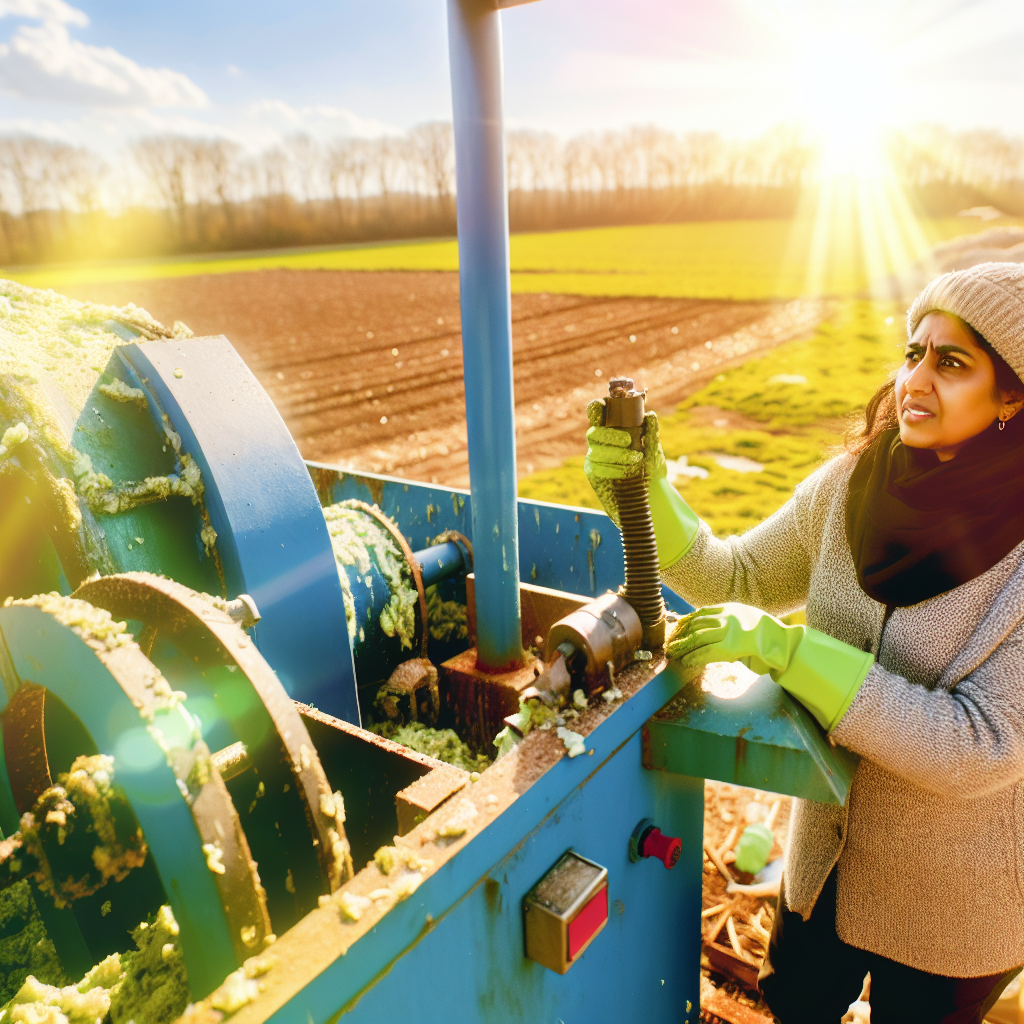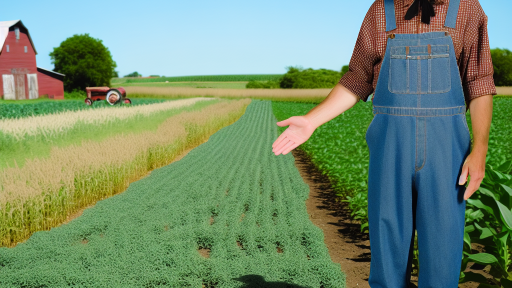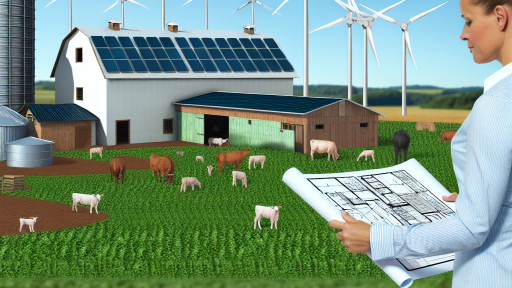Introduction to Circular Economy and Its Relevance in Agriculture
The circular economy is a transformative approach to resource management.
It emphasizes sustainability and minimizing waste.
This model is particularly relevant in agriculture, where waste can be significant.
Farm waste includes crop residues, livestock by-products, and packaging materials.
Traditional practices often treat these wastes as burdens rather than resources.
However, integrating circular economy principles can change this perspective.
By rethinking waste, farms can embrace more sustainable practices.
Understanding Circular Economy Principles
The circular economy shifts the focus from linear consumption.
Linear models lead to waste and environmental harm.
Instead, the circular model promotes resource efficiency and recycling.
This approach encourages businesses and individuals to view waste as a resource.
In agriculture, this means reusing materials and minimizing inputs.
Benefits of Circular Economy in Agriculture
Implementing circular economy practices can yield multiple benefits.
First, it reduces the environmental impact of farming operations.
Furthermore, it enhances soil health and biodiversity.
Transform Your Agribusiness
Unlock your farm's potential with expert advice tailored to your needs. Get actionable steps that drive real results.
Get StartedAdditionally, these practices can lead to cost savings for farmers.
For example, composting organic waste returns nutrients to the soil.
This reduces the need for chemical fertilizers.
Successful Examples in Farm Waste Management
Many farms worldwide have successfully integrated circular economy principles.
For instance, Smith Farms in California recycles all its organic waste.
They create compost and bioenergy from leftover crop materials.
Similarly, GreenPastures Ranch in Texas uses livestock manure as a natural fertilizer.
This not only improves soil health but also reduces pollution.
Such examples prove the feasibility of these sustainable practices.
Understanding Farm Waste
Types of Farm Waste
Farm waste includes various organic and inorganic materials.
Organic waste primarily consists of crop residues, animal manure, and food waste.
Inorganic waste comprises plastics, chemicals, and metals used in agricultural practices.
Additionally, each type offers unique challenges and opportunities for management.
Sources of Farm Waste
Farm waste originates from multiple sources within agricultural operations.
Crops generate waste during planting, growing, harvesting, and processing stages.
An example includes leftover stalks and leaves after harvesting.
Livestock operations contribute significantly through manure and bedding materials.
Furthermore, waste from equipment maintenance contributes to the overall waste stream.
Impact of Farm Waste
Excessive farm waste can harm the environment and contribute to pollution.
It may lead to soil degradation, water contamination, and greenhouse gas emissions.
Effective management strategies are essential to mitigate these impacts.
Additionally, proper waste management can enhance resource recovery and efficiency.
Opportunities in Waste Management
Managing farm waste presents numerous opportunities for farmers.
Recycling organic waste can produce compost, enhancing soil health.
Showcase Your Farming Business
Publish your professional farming services profile on our blog for a one-time fee of $200 and reach a dedicated audience of farmers and agribusiness owners.
Publish Your ProfileBiogas production from manure can generate renewable energy sources.
Moreover, employing innovative technology can streamline waste management processes.
Principles of Circular Economy Applied to Farm Waste Management
Defining the Circular Economy
The circular economy focuses on maximizing resource efficiency.
It seeks to minimize waste throughout the production process.
This approach transforms waste into valuable resources.
Reducing Waste Through Sustainable Practices
Farmers can adopt sustainable practices for waste reduction.
For example, composting organic materials enhances soil health.
Moreover, using cover crops prevents soil erosion.
These methods improve overall farm productivity.
Creating Value From Waste
Farm waste can be repurposed into useful products.
For instance, leftover crop residues can become animal feed.
Additionally, waste can be converted into bioenergy.
This adds economic value while decreasing environmental impact.
Implementing Closed-Loop Systems
Closed-loop systems significantly benefit farm management.
These systems involve reusing materials within the farm.
For instance, using livestock manure as fertilizer enhances soil fertility.
This process reduces dependency on chemical fertilizers.
Engaging Stakeholders in Waste Management
Effective waste management requires collaboration among stakeholders.
Farmers, local governments, and organizations must work together.
They can share resources and best practices.
This collaboration promotes a community-based circular economy.
Monitoring and Assessing Impact
Monitoring practices ensures the effectiveness of waste management.
Regular assessments can identify areas for improvement.
Key performance indicators help measure sustainability outcomes.
This encourages continuous progress toward better practices.
Delve into the Subject: Soil Health Practices For Sustainable Farming
Case Studies: Successful Circular Economy Practices in Farming
Farm-to-Fork Systems
Farm-to-fork systems create a direct connection between producers and consumers.
This model reduces waste and fosters local economies.
For instance, Green Fields Farm collaborates with local restaurants.
They supply fresh produce while collecting kitchen scraps for composting.
As a result, both parties benefit from reduced waste and lower transportation needs.
Agroecological Practices
Agroecological approaches prioritize sustainable farming techniques.
They include crop rotation, intercropping, and natural pest control.
Frost Valley Farm employs these methods effectively.
This practice enhances soil fertility and biodiversity.
Consequently, Frost Valley reduces dependence on synthetic inputs.
Utilizing By-Products
Farmers increasingly use agricultural by-products creatively.
These practices minimize waste and optimize resources.
Sunny Acres Orchard transforms apple waste into cider vinegar.
This process adds value to a product that would otherwise go unused.
Showcase Your Farming Business
Publish your professional farming services profile on our blog for a one-time fee of $200 and reach a dedicated audience of farmers and agribusiness owners.
Publish Your ProfileFurthermore, the waste from cider production becomes animal feed.
Community Supported Agriculture (CSA)
Community Supported Agriculture fosters strong community ties.
It connects farmers directly with consumers through subscription models.
Willow Creek Farms operates an active CSA program.
Members receive seasonal produce while supporting local agriculture.
This partnership reduces food waste and enhances food security.
Innovative Waste Management Technologies
Advancements in waste management technologies support sustainable farming.
Smart composting systems help reduce organic waste efficiently.
AgriTech Solutions developed a mobile app for waste tracking.
This app allows farmers to monitor and optimize their waste processes.
Farmers can identify which materials can be composted or recycled.
Learn More: Soil Regeneration Techniques For Modern Farms
Strategies for Reducing Farm Waste Generation
Implementing Preemptive Measures
Farmers can significantly reduce waste by assessing their practices early on.
This evaluation helps in identifying potential waste sources.
By adopting best management practices, they can mitigate waste generation.
For instance, rotating crops reduces residue buildup.
Additionally, engaging in cover cropping enriches the soil.
Enhancing Resource Efficiency
Farm operations can improve efficiency by optimizing inputs.
This includes better utilization of water and fertilizers.
By monitoring resource use, farmers can identify areas for improvement.
Implementing precision agriculture technologies enhances efficiency further.
These tools help in applying resources only where needed.
Promoting Recycling and Reuse
Farmers should emphasize recycling organic waste materials.
Creating compost from crop residues minimizes disposal need.
Furthermore, this compost enriches the soil for future crops.
On a larger scale, farms can explore bioenergy options.
This includes converting waste into renewable energy sources.
Utilizing Innovative Technologies
Technological advancements offer solutions for waste reduction.
For example, anaerobic digesters convert waste into energy.
These systems also produce valuable byproducts such as digestate.
Moreover, remote sensing and data analytics can track waste patterns.
Consequently, farmers can adjust practices based on these insights.
Engaging with Local Initiatives
Farmers should connect with local agricultural programs.
These initiatives often provide resources for waste management.
Collaboration with local organizations can amplify outreach efforts.
Moreover, sharing best practices enhances community sustainability.
This cooperative approach fosters collective knowledge-sharing.
Encouraging Continuous Education
Education plays a vital role in achieving waste reduction goals.
Farmers should attend workshops and training sessions regularly.
This ongoing education keeps them informed about new practices.
Showcase Your Farming Business
Publish your professional farming services profile on our blog for a one-time fee of $200 and reach a dedicated audience of farmers and agribusiness owners.
Publish Your ProfileFurthermore, it encourages a culture of sustainability on farms.
Ultimately, informed farmers make better decisions regarding waste.
Explore Further: Organic Farming Infrastructure Tips For Sustainable Growth
Technological Innovations Supporting Circular Economy in Agriculture
Smart Waste Management Systems
Smart waste management systems utilize technology to optimize waste processing.
These systems enhance the efficiency of waste collection and segregation.
For instance, sensors help farmers monitor waste levels in real-time.
Consequently, they can schedule collections more effectively.
Agricultural Biogas Production
Agricultural biogas production converts organic waste into renewable energy.
This process reduces methane emissions from decomposing waste.
Moreover, it generates a valuable resource for energy and fertilizer.
Farmers can power their operations sustainably using this energy source.
Precision Agriculture Tools
Precision agriculture tools streamline resource use in farming.
They enable farmers to apply inputs precisely where needed.
This technology minimizes waste and maximizes efficiency.
Examples include drones and soil sensors that provide detailed data.
Composting Technologies
Advanced composting technologies transform farm waste into organic matter.
These systems enhance soil health and fertility.
Farmers can use fast and efficient composting methods to recycle waste.
This practice reduces the amount of waste sent to landfills.
Innovative Packaging Solutions
Innovative packaging solutions contribute to waste reduction in agriculture.
These solutions often utilize biodegradable or recyclable materials.
As a result, they help in maintaining a circular economy.
Farmers benefit from using sustainable packaging options that align with eco-friendly practices.
Data Management Platforms
Data management platforms assist farmers in tracking waste production.
These platforms can analyze waste patterns and suggest improvements.
By leveraging data, farmers can make informed decisions to reduce waste.
This ultimately supports a more sustainable agricultural practice.
Learn More: Enhancing Soil Health through Integrated Pest Management

Collaboration and Partnerships in Promoting Circular Economy
Importance of Collaboration
Collaboration is key to advancing the circular economy in agriculture.
It fosters innovation by bringing together diverse expertise.
Additionally, partnerships enhance resource sharing among stakeholders.
Farmers, businesses, and local communities benefit from working together.
Furthermore, they can collectively address common challenges.
Building Effective Partnerships
Building effective partnerships requires clear communication.
Each party should understand their roles and responsibilities.
Moreover, establishing trust is essential for collaboration.
Regular meetings can facilitate relationship-building and alignment.
Stakeholders should also set shared goals for sustainability.
Examples of Successful Collaborations
One successful collaboration is between farmers and waste management firms.
They convert farm waste into energy and fertilizers.
Showcase Your Farming Business
Publish your professional farming services profile on our blog for a one-time fee of $200 and reach a dedicated audience of farmers and agribusiness owners.
Publish Your ProfileThis approach reduces landfill use and lowers emissions.
Another example is collaboration between universities and agricultural enterprises.
They conduct research to develop sustainable practices and technologies.
Engaging Local Communities
Engaging local communities is essential for effective waste management.
Education programs raise awareness about circular economy principles.
These initiatives encourage community involvement in waste reduction.
Moreover, local partnerships can ensure waste is used effectively.
Community gardens serve as a prime example of this engagement.
Government and Policy Support
Government support plays a crucial role in facilitating partnerships.
Policies can incentivize collaboration among stakeholders.
Grant programs can fund innovative waste management projects.
Furthermore, regulatory frameworks encourage the circular economy.
Governments can facilitate networking events to connect diverse players.
Challenges and Barriers to Integrating Circular Economy in Farm Waste Management
Lack of Awareness and Understanding
Many farmers do not fully understand the circular economy concept.
This lack of awareness can lead to resistance against adopting new practices.
Education programs can help bridge this knowledge gap effectively.
Furthermore, outreach initiatives can demonstrate the benefits of circular approaches.
Economic Constraints
Implementing circular economy practices often requires initial investments.
Many farmers face tight budgets and limited access to financial resources.
Subsidies and grants can alleviate some of these economic burdens.
Additionally, developing low-cost solutions can foster adoption in the sector.
Regulatory Challenges
Current regulations may not support circular economy practices adequately.
Inflexible policies can hinder the implementation of innovative ideas.
Working with regulators can facilitate necessary policy adjustments.
Moreover, developing a supportive regulatory framework can encourage adoption.
Cultural Resistance to Change
Tradition plays a significant role in farming practices.
Many farmers are hesitant to change methods that have worked for generations.
Fostering a culture of innovation can help overcome this resistance.
Peer-to-peer learning and success stories can inspire change effectively.
Technical Limitations
A lack of access to advanced technologies can limit waste management efforts.
Farmers may lack the technical know-how to implement circular solutions.
Training programs can enhance skills and knowledge in this regard.
Partnerships with technology providers can also facilitate access to necessary tools.
Infrastructure Gaps
Inadequate infrastructure can pose significant challenges to circular economy integration.
In many regions, facilities for waste processing are limited or unavailable.
Investment in infrastructure can significantly boost waste management efforts.
Collaboration between various stakeholders can lead to better infrastructure development.
Future Trends: The Role of Policy and Education in Advancing Circular Practices
Policy Development and Implementation
Effective policies drive the transition to a circular economy in agriculture.
Governments can establish regulations that prioritize waste reduction.
Incentives for sustainable practices encourage farmers to adopt circular methods.
Showcase Your Farming Business
Publish your professional farming services profile on our blog for a one-time fee of $200 and reach a dedicated audience of farmers and agribusiness owners.
Publish Your ProfileClear policies provide a framework for businesses to follow.
Such frameworks create a consistent approach across various sectors.
Collaboration Between Stakeholders
Collaboration among stakeholders enhances policy effectiveness.
Farmers, local governments, and NGOs can work together towards common goals.
This collaboration fosters an environment of shared learning and innovation.
Moreover, it helps identify challenges and solutions in waste management.
Regular communication creates a more informed stakeholder community.
Education and Awareness Campaigns
Education plays a critical role in advancing circular economy practices.
Awareness campaigns inform farmers about sustainable waste management techniques.
Workshops can demonstrate practical applications of circular practices.
Educational institutions must integrate circular economy concepts into curricula.
This integration prepares future professionals for sustainable agriculture.
Investment in Research and Development
Investment in research supports innovative solutions for farm waste management.
Research institutions can collaborate to develop new technologies.
This collaboration can generate knowledge about effective circular practices.
Furthermore, it encourages the adoption of best practices across the industry.
Funding for R&D ensures that innovations reach farmers who need them.
Measuring Success and Impact
Establishing metrics helps track the success of implemented policies.
Measuring impact ensures that initiatives are achieving desired outcomes.
Key performance indicators can guide future improvements.
Regular assessments keep stakeholders informed about progress.
This transparency builds trust and engagement in circular practices.
Additional Resources
Invited Speeches, Talks, and Outreach (Rutgers EcoComplex)
From Supply Chains to Regenerative Agricultural Practices, NIFA …




